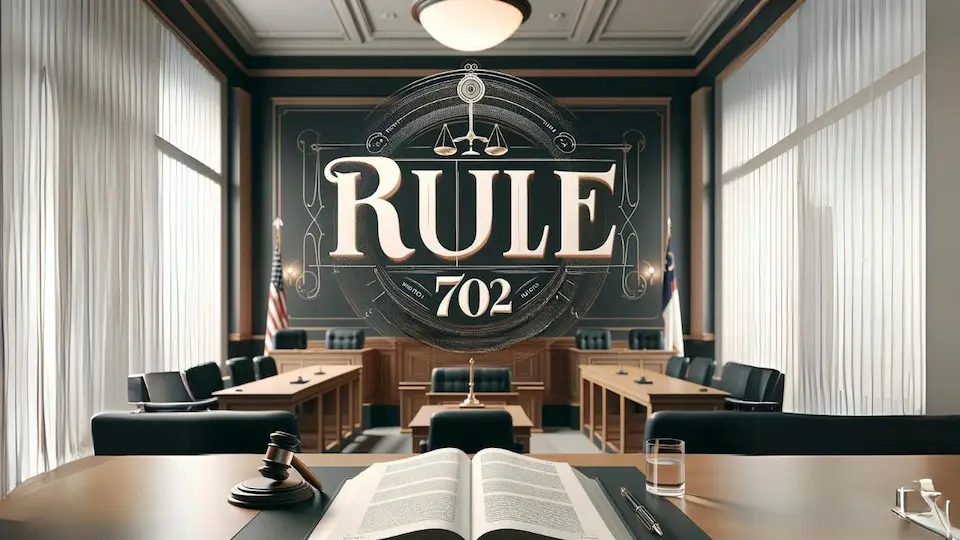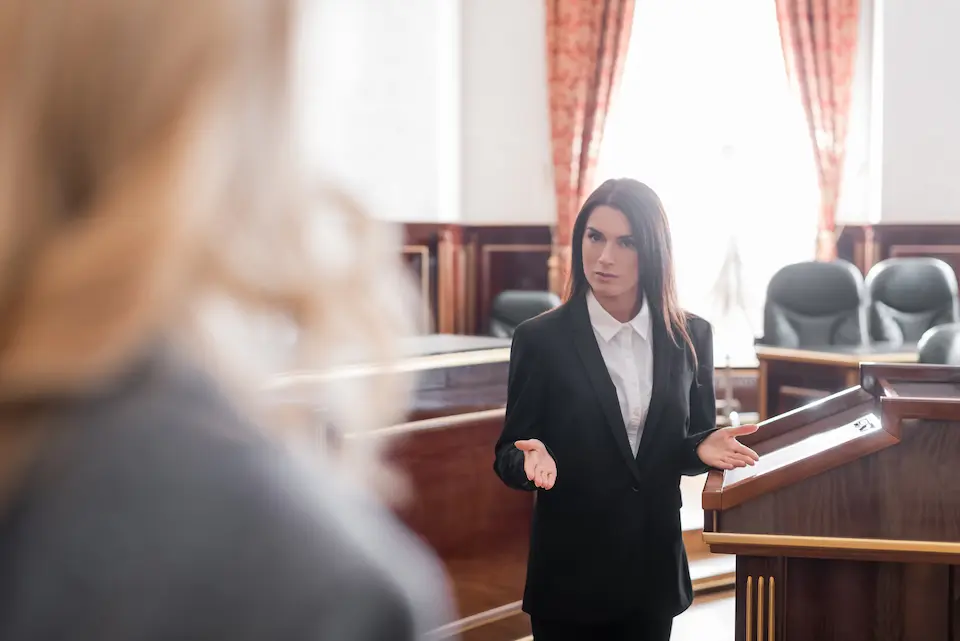CBD products have become all the rage lately, but before you buy CBD and any…

In the intricate tapestry of legal proceedings, the role of expert witnesses often serves as a critical linchpin, particularly in jurisdictions like North Carolina. Central to the framework governing the admission of expert testimony is Rule 702 of the North Carolina Rules of Evidence, a pivotal guideline shaping the presentation and assessment of expert evidence in courts across the state.
Understanding the nuances of Rule 702 and the significance of expert witnesses is indispensable for both legal practitioners and those navigating the judicial system.
In this comprehensive guide, our Raleigh criminal defense attorney is delving into the intricacies of Rule 702 and exploring the multifaceted role of expert witnesses in North Carolina. From shedding light on their responsibilities, the process of presenting their testimony, and recent developments, to offering valuable insights for lawyers and expert witnesses alike.
What is Rule 702?
Rule 702 of the North Carolina Rules of Evidence serves as a cornerstone in the realm of expert testimony, establishing criteria for the admissibility of such evidence in court proceedings:
- Qualification of Expert Witnesses: The expert witness definition requires that expert witnesses possess specialized knowledge, skill, experience, training, or education that renders them capable of offering opinions that will assist the trier of fact.
- Admissibility Standard: The expert's opinion must be based on sufficient facts or data and must be the product of reliable principles and methods.
- Relevance: The expert witness testimony must be relevant to the issues in dispute, addressing specific questions or matters central to the case.
By adhering to the principles outlined in Federal Rule 702, courts strive to ensure the integrity of such testimony and enhance the administration of justice. Understanding the nuances of the federal rules is essential for legal practitioners, as it shapes the presentation and assessment of an expert's scientific evidence in North Carolina courts.
The Role of Expert Witnesses in North Carolina
An expert's testimony is pivotal in legal proceedings across North Carolina, bringing specialized knowledge and insights from a particular field to assist the trier of fact in understanding complex issues and reaching informed decisions. Whether needed to confirm or dispute evidence or to determine that a suspect has been falsely accused of a crime, their testimony can be crucial to the court proceedings.
Types of Cases
Expert witnesses are commonly utilized in a wide range of cases in North Carolina, including civil litigation, criminal trials, family law matters, and administrative hearings. The expert's knowledge may be sought in fields such as medicine, engineering, forensics, accounting, psychology, and more.
Responsibilities and Duties
Expert witnesses have a duty to provide impartial and objective opinions based on their specialized knowledge and experience. They are tasked with analyzing evidence, formulating opinions, and presenting their findings clearly and understandably to the court.
Impact on Case Outcomes
The testimony of expert witnesses can have a significant impact on case outcomes, often serving as a linchpin in proving or refuting key elements of a case. Judges and juries rely on expert testimony to navigate technical or scientific issues beyond their expertise, making expert witnesses instrumental in shaping the course of litigation.
Pre-trial Preparations
Before trial, expert witnesses undergo thorough preparations to ensure they are well-versed in the facts of the case, familiar with relevant legal standards, and ready to effectively communicate their opinions during examination. Attorneys play a crucial role in preparing expert witnesses for deposition and trial testimony.
Direct and Cross-Examination
Expert witnesses undergo both direct examination by the party calling them and cross-examination by opposing counsel. During direct examination, they present their opinions and supporting rationale. Cross-examination aims to challenge the credibility and reliability of the expert's opinions, often testing the foundation of their expertise and methodologies.
Challenges and Objections
Expert testimony may face challenges and objections from opposing parties, particularly regarding the admissibility of opinions or the qualifications of the expert witness. Common objections include lack of relevance, reliability, or qualifications under Rule 702.
Benefits of Expert Witnesses for the Defense
Expert witnesses play a crucial role in the defense of individuals facing misdemeanor charges or felony convictions in North Carolina. Their specialized knowledge and expertise offer several significant advantages for defendants and their legal teams.
Technical Expertise
Expert witnesses bring specialized technical knowledge and expertise to the defense team. Whether it's in areas like forensic science, medical analysis, or engineering, their insights can help clarify complex issues and provide alternative interpretations of evidence.
Rebuttal of Prosecution's Claims
Expert witnesses can effectively rebut the prosecution's arguments and evidence. By offering alternative opinions or interpretations backed by scientific principles, they can challenge the credibility of prosecution witnesses and raise reasonable doubt in the minds of jurors.
Case Strategy and Preparation
Expert witnesses assist defense attorneys in formulating case strategies and preparing for trial. Their input helps attorneys anticipate the prosecution's arguments and identify weaknesses in their case, allowing for more effective cross-examination and presentation of evidence.
Educating the Jury
Expert witnesses serve as educators for the jury, explaining complex concepts and technical details in a manner that is accessible and understandable. By breaking down complicated information, they help jurors make informed decisions and assess the credibility of competing expert testimonies.
Building Credibility
Expert witnesses lend credibility to the defense's arguments and assertions. Their professional credentials and expertise command respect in the courtroom, enhancing the overall credibility of the defense case.
Testifying to Mitigating Factors
In cases where the defendant's actions may have been influenced by factors such as mental health issues or environmental conditions, expert witnesses can provide valuable testimony to mitigate culpability. Their insights into human behavior, cognitive processes, and psychological factors can help jurors understand the complexities of the defendant's circumstances.
Supporting Legal Arguments
Expert witnesses provide support for legal arguments made by the defense. Whether it's challenging the admissibility of evidence, interpreting statutes or regulations, or assessing the validity of legal claims, their expertise strengthens the defense's legal position.

Defense Challenges Presented by Expert Witnesses
While expert witnesses can be valuable assets to the defense in North Carolina courts, their involvement also presents certain challenges that defense attorneys must navigate effectively.
Cost and Resources
Engaging expert witnesses can be expensive, requiring significant financial resources for their fees, travel expenses, and preparation costs. For indigent defendants or those with limited resources, securing funding for expert witnesses may present a significant hurdle.
Counter-Expert Testimony
The prosecution may present their own expert witnesses to counter the opinions offered by the defense's experts. This can create a battle of conflicting expert testimonies, complicating the jury's task of determining the truth and potentially undermining the defense's case.
Credibility and Bias
Defense attorneys must carefully vet expert witnesses to ensure their credibility and impartiality. Any perception of bias or lack of credibility could undermine the effectiveness of their testimony and weaken the defense's position.
Cross-Examination Challenges
Expert witnesses are subject to rigorous cross-examination by opposing counsel, who may attempt to discredit their testimony, challenge their qualifications, or highlight inconsistencies in their opinions. Defense attorneys must prepare their expert witnesses thoroughly to withstand cross-examination and maintain their credibility.
Complexity of Testimony
Expert testimony often involves complex technical or scientific concepts that may be difficult for jurors to understand. Defense attorneys must ensure that expert witnesses can communicate effectively with jurors, avoiding jargon and presenting information in a clear and accessible manner.
Admissibility Challenges
The admissibility of expert testimony is subject to scrutiny under Rule 702 of the North Carolina Rules of Evidence. Defense attorneys may face challenges from the prosecution regarding the reliability, relevance, or qualifications of their expert witnesses, potentially leading to the exclusion of crucial evidence.
Juror Skepticism
Some jurors may be skeptical of expert testimony, viewing it as biased or unreliable. Defense attorneys must address any preconceived notions or misconceptions about expert witnesses and their role in the legal process, ensuring that jurors give due weight to their testimony.
Need Legal Representation in Raleigh? Contact Our Experienced Defense Attorneys Today
Whether you're facing criminal charges, navigating a civil dispute, or seeking guidance on legal matters, our dedicated team of criminal defense lawyers from the Law Offices of J.M. Kotzker is here to help.
With years of experience defending clients in North Carolina courts, we understand the complexities of the legal system and are committed to advocating for your rights and interests. Don't face the legal process alone– reach out to us for personalized and strategic representation tailored to your unique circumstances.
Contact us today to schedule a consultation and take the first step towards securing the legal representation you deserve by calling us at 919-439-5104 or filling out the form below to get started.
